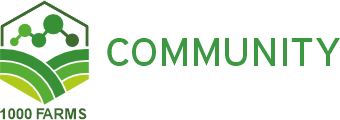Click on the link below to view the webinar by Bolanle Adebayo, PhD Candidate at Virginia Tech, USA, on 3 April 2025, presenting Phenomenological Exploration of Participation in Citizen Science and Food Systems Leadership
Presenter Bio: Bolanle Adebayo is a PhD candidate in the Department of Agricultural Leadership and Community Education at Virginia Tech, USA, studying issues at the nexus of community leadership development, agricultural development, farmer-2-farmer extension approach and food systems leadership. She is currently undertaking research to explore the possibilities of leadership development and behaviors in citizen science initiatives such as tricot.
For more into contact Bolanle at: abolanle@vt.edu
Summary : The challenges faced within the food systems are complex and require leadership transformation at multi-stakeholder levels, necessitating ordinary citizens’ involvement in food systems leadership. However, little research has focused on leadership within the food systems. The presentation proposes a research study that seeks to explore the possibilities of leadership development and behaviors in citizen science initiatives such as tricot.
| Question | Answer |
|---|---|
| Do you have an idea of the influence of culture might be on, on the answers of people, as often identity is really wrapped in into local culture? how could you disentangle that in your results? | I am exploring how culture influences identity, especially in the context of female farmers selected by tricot for both production and processing abilities. Many of these farms are female-led, but due to cultural influences, women may not view themselves as leaders, even if they are. That’s why I am intentionally avoiding direct questions about leadership in my research. Instead, I am focusing on their roles, actions, and interactions, allowing me to interpret leadership through their stories without imposing a label. |
| What factors do you think may motivate farmers to engage in citizen science experiments? | I think the factors that motivate participation could be a study on their own, but I do have a question in my interview protocol that addresses it. From what I’ve seen in the literature, motivations might include personal interest, agency, wanting to have their voice heard, contributing to the community, or gaining social prestige. They might also benefit in other ways—maybe financially or through gaining knowledge. I’m hoping that through my study, I’ll get a clearer understanding of what truly drives their participation. |
| What challenges or barriers might prevent their participation? | Since I’m working with a social group, one thing I’ve noticed is the idea of the implicit theory of leadership—where people assign leadership roles based on external perceptions. Sometimes, people see others as leaders simply because of how they appear or behave over time. But not everyone wants to be seen as a leader, especially if their past experiences with leadership were negative. For example, if they were part of projects like tricot or other development initiatives that ended up being exploitative—where only a few benefited—it could create social tension, inequality, or even envy. Because of that, some people might avoid being associated with leadership roles to stay connected to their community and avoid being seen as outsiders. That, along with things like extra responsibilities, could be a real challenge. |
| What indicators would you use to identify and measure leadership behavior? | I’m trying to understand the concept of leadership within the context of Citizen Science. I’m not using surveys or predefined indicators—instead, I’m relying on what participants actually say. I’m doing in vivo coding, meaning I’ll use their own words during analysis. While I’m aware of general leadership traits like communication, social influence, or helping others, I want the meaning of leadership to come from the participants themselves. Even if they don’t label something as “leadership,” their experiences and perspectives will shape how I analyze it. I came across a leadership identity scale, but during a presentation at school, it was pointed out that it might not apply in a Nigerian context since it was developed in the U.S. So I’ve decided not to use any standardized indicators—my findings will be grounded entirely in participants’ own narratives. |
| In tricot, in Nigeria, sampling tries to increase the diversity in the group. How will that affect identity and leadership across a pre existing group? Would you be able to detect if this has positive or negative effects on social interaction? | In Nigeria, sampling is done by identifying existing groups within each community, and people are selected from those groups. That raised a question for me—leadership over whom? Does leadership stay within each group, or does it extend across social divides, like between migrants and those with more permanent land rights? Leadership isn’t just about individual traits; it’s also about social interaction and possibly bridging social capital. Initially, I wanted to explore this by doing a social network analysis to understand the network effects of leadership. But due to time constraints—and my committee’s advice—I’m not including that in this study. Still, it’s something I’d like to explore in the future. For now, I’m making sure all my interview questions are framed around their participation in tricot specifically. For example, I’ll ask whether tricot changed how people see you, to better understand the social dynamics and possible shifts in perceived leadership tied directly to this experience. |

